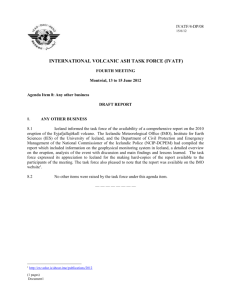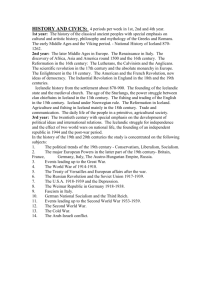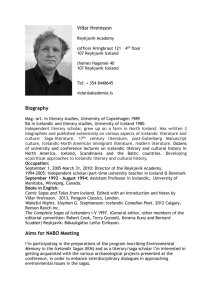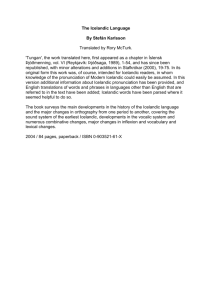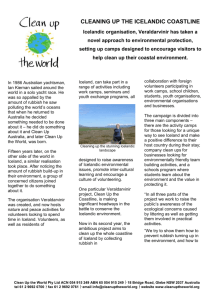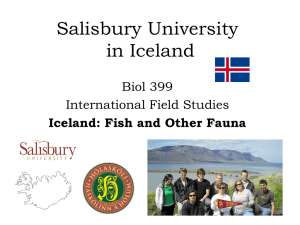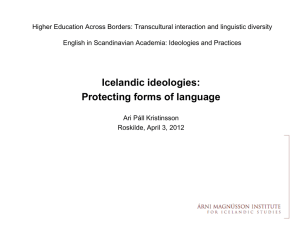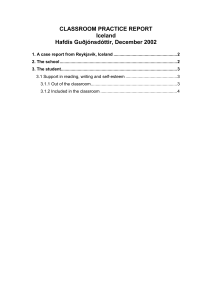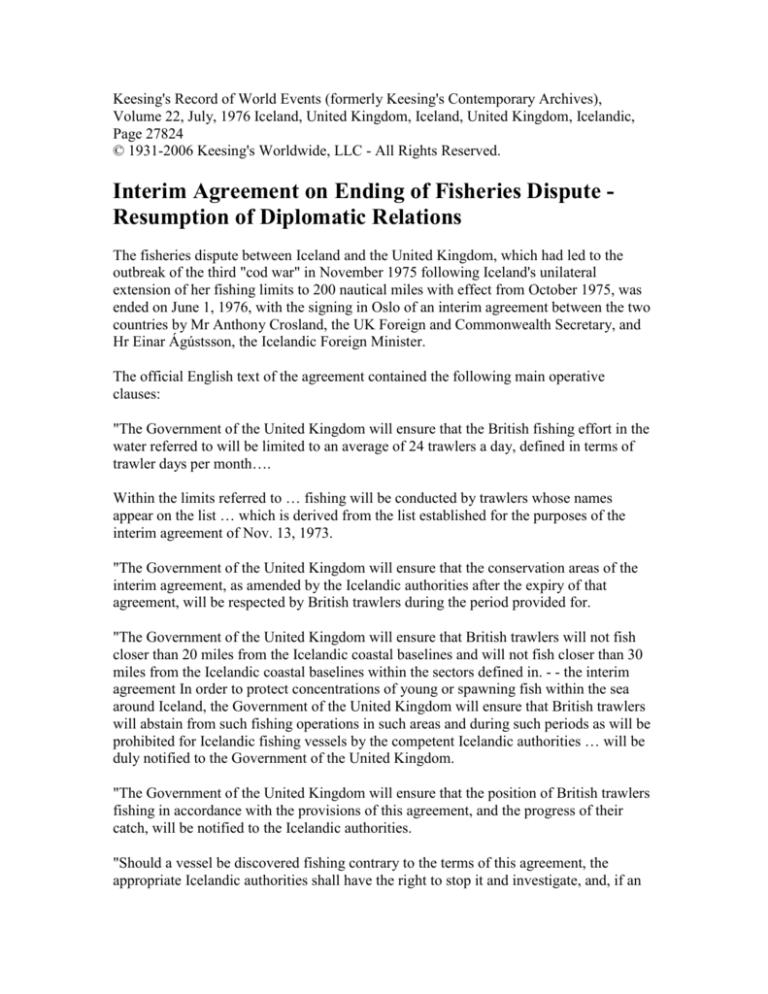
Keesing's Record of World Events (formerly Keesing's Contemporary Archives),
Volume 22, July, 1976 Iceland, United Kingdom, Iceland, United Kingdom, Icelandic,
Page 27824
© 1931-2006 Keesing's Worldwide, LLC - All Rights Reserved.
Interim Agreement on Ending of Fisheries Dispute Resumption of Diplomatic Relations
The fisheries dispute between Iceland and the United Kingdom, which had led to the
outbreak of the third "cod war" in November 1975 following Iceland's unilateral
extension of her fishing limits to 200 nautical miles with effect from October 1975, was
ended on June 1, 1976, with the signing in Oslo of an interim agreement between the two
countries by Mr Anthony Crosland, the UK Foreign and Commonwealth Secretary, and
Hr Einar Ágústsson, the Icelandic Foreign Minister.
The official English text of the agreement contained the following main operative
clauses:
"The Government of the United Kingdom will ensure that the British fishing effort in the
water referred to will be limited to an average of 24 trawlers a day, defined in terms of
trawler days per month….
Within the limits referred to … fishing will be conducted by trawlers whose names
appear on the list … which is derived from the list established for the purposes of the
interim agreement of Nov. 13, 1973.
"The Government of the United Kingdom will ensure that the conservation areas of the
interim agreement, as amended by the Icelandic authorities after the expiry of that
agreement, will be respected by British trawlers during the period provided for.
"The Government of the United Kingdom will ensure that British trawlers will not fish
closer than 20 miles from the Icelandic coastal baselines and will not fish closer than 30
miles from the Icelandic coastal baselines within the sectors defined in. - - the interim
agreement In order to protect concentrations of young or spawning fish within the sea
around Iceland, the Government of the United Kingdom will ensure that British trawlers
will abstain from such fishing operations in such areas and during such periods as will be
prohibited for Icelandic fishing vessels by the competent Icelandic authorities … will be
duly notified to the Government of the United Kingdom.
"The Government of the United Kingdom will ensure that the position of British trawlers
fishing in accordance with the provisions of this agreement, and the progress of their
catch, will be notified to the Icelandic authorities.
"Should a vessel be discovered fishing contrary to the terms of this agreement, the
appropriate Icelandic authorities shall have the right to stop it and investigate, and, if an
infringement is suspected, to summon the nearest British support vessel. Any trawler
found to have violated the terms of the agreement will be crossed off the list.
"The Government of the United Kingdom will forthwith invite the European Economic
Community to apply, as soon as the necessary arrangements can be made, the provisions
of Protocol No.6 to the agreement of July 22, 1972, between the Government of Iceland
and the Community. They will also use their best endeavours to ensure that the tariff
concessions provided for in that protocol will be applied at the level which they would
have reached had it been in force since 1973. [Protocol 6 of the 1972 EEC-Iceland free
trade agreementage 25448-proposed a reduction of tariffs, currently between 2 and 18 per
cent, for imports to the EEC of
"Nothing in this agreement shall be considered to prejudice the views of the parties with
regard to the mutual limitation of their areas of jurisdiction.
"(10) This agreement shall have a duration of six months from the date of its entry into
force. After its expiry British vessels will fish within the waters defined in the Icelandic
regulations of July 15, 1975 only to the extent provided for in arrangements agreed with
the Government of Iceland."
Mr Crosland said after the signing of the agreement that it would be the last which would
be negotiated bilaterally between London and Reykjavik, as Britain would ask her
partners in the EEC to negotiate jointly with Iceland any agreement to succeed the
present interim one after they had proclaimed their own 200-mile economic zones.
Mr Crosland also said: "The agreement has been attacked as a 'sell-out' by both sides,
which suggests that a reasonable compromise has been reached, not a surrender by either
side but a victory for common sense." The terms were the best that Britain could obtain,
he added, as almost every country in the world was extending its fisheries limits to 200
miles. He admitted that there would have to be structural changes in the British fishing
industry, which would be painful, but said that Britain would press for EEC funds to help
those hit by these changes.
Hr Ágústsson, on the other hand, said: "We have won the war, but we won at the
conference table because the British changed their attitude." He added that Iceland would
have accepted the terms of the agreement if they had been put forward by the British
Government three months earlier.
The agreement was severely criticized by representatives of the British fishing industry
and also by several Conservative members of Parliament.
A spokesman for the British Trawlers' Federation said on May 30, when the proposed
agreement had become known, that it might mean the loss of up to 9,000 jobs (1,500 at
sea and 7,500 on shore) because 60 deep-sea trawlers, which could not be used
elsewhere, would be out of business". Although no figure was given in the agreement for
the catch allowed for British trawlers, Mr Austen Laing, director-general of the British
Trawlers' Federation, estimated that the new agreement would mean a yield of about
30,000 tons a year, most of it cod.
Among MPs Mr Michael Brotherton (Conservative member for Louth, adjacent to Mr
Crosland's own constituency of Grimsby, which is itself a major trawler port) on June 1
called the agreement "abject surrender" and observed that it gave British trawlers "far less
freedom of action than would have been the case had we accepted the Icelandic offer of
65,000 (of fish catches) last year".
The involvement of the British Navy in the "cod war" had meant the deployment of a
total of 20 frigates (operating in rotation to enable between four and six frigates to be
present off Iceland's coast at any one time) with 4,500 men, and also of seven Royal Fleet
auxiliary vessels with 446 men. Collisions between frigates and Icelandic gunboats had
totalled 45, with 15 frigates being damaged at a cost of at least £1,000,000, in addition to
which Icelandic coastguard vessels had cut 45 warps of trawlers with a loss of fishing
gear worth £75,000.
Earlier "Cod War" Developments
During the months leading up to the agreement the activities of British trawlers in waters
around the coasts of Iceland had been reduced partly as a result of" harassment" by
Icelandic coastguard vessels and partly because of a drop in the price of cod.
The UK Ministry of Agriculture, Fisheries and Food announced on March 29 that
between Feb. 2 and March 20, 1976, British trawlers had caught 8,327 tonnes of fish off
Iceland's coast i.e. in effect 484 tonnes less than provided under the voluntary quota
agreed upon on Feb. 6, 1976, between the Ministry and the British Trawlers' Federation
and 3,756 tonnes below the total caught in the corresponding period in 1975; of the fish
caught, cod had accounted for 7,649 tonnes (354 tonnes below the agreed limits and
2,818 tonnes below 1975 levels). Up to April 24, the cod caught totalled 12,400 tonnes,
compared with 15,800 tonnes in the same period in 1975.
Mr Laing was on March 25 reported to have complained that the British Government was
not giving the fishing industry support comparable with that given by the Governments of
Canada or Norway to their industries, and to have claimed that Britain had in 1975 spent
at least £12,000,000 on imported cod, which, he said, represented a year's work for 20
British trawlers.
On April 30 it was reported that the British Government had asked UK trawlers to move
no further than 20 miles off the coast of Iceland, instead of up to 12 miles as before. [20
miles was the basic limit embodied in the agreement of June
Towards the end of April the number of trawlers fishing off Iceland fell from 40 (the
number operating in these waters in Februaryage 27688) to 21, and on May 8 the
remaining trawler crews sent a message to the Government stating that they would
"strongly consider" pulling out of the fishing grounds by noon on May 4 unless they were
given adequate protection against Icelandic patrol boats and tax-free compensation for
working hours lost because of Icelandic harassment.
This development led a spokesman for the Icelandic coastguard to declare on May 5 "For
us there is no longer a cod war, as all British trawlers have now left the Icelandic fishing
grounds. The cod war was finished today with complete British surrender." How-ever, a
spokesman for the British Ministry of Defence stated on the same day that 15 trawlers
which had withdrawn on the previous day had meanwhile returned, and Mr Laing
confirmed this, saying that the cod war had "not been abandoned".
Mr William Rodgers, UK Minister of State for Defence, said in a statement in the House
of Commons on May 5 that "for the most part" naval protection of British trawlers had
proved very effective, that no trawlers had been arrested, and that between Feb. 28 and
April 21 only one trawler had had its warps cut. However, he added : "Icelandic gunboats
have recently adopted new and particularly dangerous tactics, resulting in serious damage
to a number of Royal Navy ships. … For the first time there have been as many as six
gunboats deployed… simultaneously, and they have been particularly favoured by
weather conditions. In responding to their aggressive and dangerous behaviour we have
had to bear in mind our wish to avoid escalatory action which might prejudice the
chances of a peaceful settlement or increase the risk to both British and Icelandic lives."
Mr Frederick Peart, the Minister of Agriculture, Fisheries and Food, announced in the
House on May 6 that the Government would send two more frigates and one more
civilian protection vessel to the disputed fishing waters off Iceland, but he did not refer to
the question of compensation as demanded by the trawlermen.
The British Trawlers' Federation pointed out that Mr Peart had said nothing either about
instructions to the Royal Navy, of which trawlermen had alleged that it was seeking to
avoid direct engagements with Icelandic vessels, with the result that there had been" a
dramatic fall in catches".
The British decision to increase the number of naval vessels off the coast of Iceland led to
sharp reactions in that country, with several Icelandic ministers declaring on May 8–9
that a settlement was "now out of the question".
Hr Olafur Johannesson, the Minister of Justice, who was in charge of the coastguard,
expressed "very deep disappointment" at the fact that Dr Kissinger, the US Secretary of
State, had not only refused to lease two fast patrol boats to Iceland but had also, while
Iceland's request for these boats was still being studied, informed the British (on April
24) that it would be rejected. This, Hr Johannesson said, was not the action to be
expected from a country which had a defence agreement with Iceland and maintained
important installations in Icelandic territory (i.e. the NATO base at Keflavik with its
radar and communications network, which had during February 1976 been the scene of
protests by Icelandic fishermen).
After further collisions had taken place on May 6–7 between British frigates and
Icelandic coastguard vessels, some British trawler crews refused to continue fishing on
May 7 in protest against the British Government's failure to offer them financial
compensation.
As British frigates were not designed to withstand impacts such as those suffered from
Icelandic gunboats, the British Royal Navy decided-as confirmed on May 20-to fit all
frigates serving off Iceland with wooden fenders round the bows and stern and to line
them internally with sandbags as a protection against further damage.
The Icelandic Government's position was strongly supported by the other membercountries of the Nordic Council.
The Presidium of the Nordic Council, meeting in Copenhagen on Feb. 29, 1976, issued a
recommendation to all Nordic Governments to take special measures to ensure that the
resources of the sea, which were "the basis of the existence of our Icelandic brother
nation", were not exhausted, and to press for the withdrawal of the British warships
which were" preventing a peaceful solution of the conflict".
Hr Geir Haligrimsson, the Icelandic Prime Minister, reaffirmed at the meeting on March
2 that any renewed talks to settle the dispute were" absolutely conditional " on the
complete withdrawal of British frigates and on increased understanding in Britain for
Iceland's needs. He also said "We could talk in terms of a 100-mile limit on an interim
basis… - If the British were to set themselves the same conditions in their conflict with
Iceland as they set other members of the Common Market then they would stay outside
the 100-mile zone. We feel that people should be adult enough to settle problems without
violence"
At the end of a conference in Stockholm on March 26 the Foreign Ministers of the Nordic
Council's member-countries made a further call on Britain to withdraw her warships from
the waters around Iceland.
During April the British Government began to discuss the dispute with the Government
of Norway (which had represented Iceland's interests vis-a'-vis the British Government
since the severance of diplomatic relations between the two countries on Feb. 19, 1976
age 27638).
Mr Roy Hattersley, UK Minister of State for Foreign and Commonwealth Affairs, visited
Oslo on April 21 for talks with Hr Odvar Nordli, the Norwegian Prime Minister, and Hr
Knut Frydenlund, the Foreign Minister.
Mr Crosland had talks on Britain's dispute with Iceland with Hr Frydenlund in Oslo on
May 18 prior to a meeting of NATO Foreign Ministers, and Hr Frydenlund said on May
19 that Norway was willing to mediate in the dispute but that neither side wanted it; that
it would be "psychologically helpful" if Britain withdrew her frigates from the disputed
waters; and that it might be possible to link a withdrawal of the frigates with an Icelandic
commitment to begin negotiations.
Hr Ágústsson said in Oslo on May 20 that it was "extremely likely" that Iceland would
give formal notice of her intention to leave the Atlantic Alliance unless there was a cod
war settlement within six months, and that, even if negotiations were started, Icelandic
gunboats would continue their operations.
Later on May 20 and 21 Mr Crosland had talks with Hr Ágústsson, which were joined by
Hr Hallgrímsson, the Icelandic Prime Minister, on the latter day. The Icelandic
Government met on May 24 to consider the two ministers' report on their talks with Mr
Crosland, and the two parliamentary committees involved heard their report on May 27.
All three Icelandic opposition parties stated on May 28 that they were opposed to any
agreement with Britain to end the cod war, especially as the depletion of fish stocks was
such, they alleged, that there was nothing left to give away ' to foreign trawler fleets.
However, on May 80 the Governments of the two countries issued simultaneous
statements that talks would be reopened in Oslo.
The Icelandic Government announced that it had decided to "explore if it is feasible to
reach a short-term agreement", and the UK Foreign and Commonwealth Office stated
that British frigates were being withdrawn "in the belief that negotiations could now be
held with good prospects of an agreement". At the same time the UK Ministry of
Agriculture, Fisheries and Food signalled to 31 trawlers fishing off south-east Iceland to
haul in their nets but to remain in the fishing grounds for the time being-with the object
of providing "a suitable atmosphere for the talks" and with skippers and crews being
offered compensation for the loss of fish if they agreed.
Mr Crosland and a British delegation accordingly concluded the interim agreement with
an Icelandic delegation led by Hr Ágústsson and Hr Matthias Bjarnason, Iceland's
Minister of Fisheries, in Oslo on May 31–June 1.
Defending the conclusion of the agreement-reached "against background of an inexorable
worldwide move towards 200-mile limits "-in the House of Commons on June 7, Mr
Crosland said inter alia that there was only one alternative.
"That," he said, "was to continue to pursue the cod war, with the certainty of dangerous
escalation, with international and especially NATO opinion moving sharply against us, at
a mounting cost in terms of naval protection, with our moral position steadily eroding as
nation after nation accepted the principle of 200 miles, until, after only a few months,
Britain and the EEC ourselves accepted 200 miles.
"It has been clear for some time to all thinking people, even if not to the more backward
sections of the trawling industry," he continued, "that in a world of 200-mile limits the
industry must face a major adaptation. The content of the catch will change dramatically.
The distant-water fleet will decline, the inshore and near-water fleets will expand. The
painful changes… would have had to occur anyway, whether I had signed this agreement
or not."
On the compensation question Mr Laing had said on June 2 that the fishing industry
would submit to the Government claims for between £25,000,000 and £80,000,000.
Compensation paid so far was stated to amount to £74,000. Mr Peart also announced in
the House of Commons on June 8 that compensation would be paid to trawler skippers
and crews who had been asked to cease fishing during the completion of the agreement at
the rate of £400 per day per trawler (£350 for side trawlers from Fleetwood), this extra
total being not expected to exceed £30,000 (according to Mr Edward Bishop, Minister of
State for Agriculture, Fisheries and Food).
As also agreed during the negotiations in Oslo, diplomatic relations between Britain and
Iceland, which had been broken off by Iceland on Feb. 19, were formally restored on
June 2.
Special rights to fish in the Icelandic 200-mile zone were granted to Norwegian
fishermen in an exchange of notes, announced on March 12, 1976, laying down that
between Feb. 15 and Dec. 1, 1976, up to 45 Norwegian trawlers would be permitted to
fish in the zone on condition that no more than 28 of them would be present within the
zone and their catch would be within limits still to be specified.
An agreement between Iceland and the Faroes, signed on March 24, 1970, provided for
an annual quota of 17,000 tonnes of fish, including 8,000 tonnes of cod, to be caught by
Faroese fishermen using trawlers catching fresh fish inside Iceland's 200-mile limit,
while trawlers preparing salted fish would have to remain outside the zone.
The agreement between Iceland and West Germany, which expired on April 28, was not
terminated by Iceland on that date, when Hr Hallgrímsson stated that his Government
wished to give the West German Government a chance to explain what it had done to
enable Iceland to benefit from preferential tariffs for its fish products imported to EEC
member-countries.
In the light of the settlement of the fisheries dispute with Britain, it was announced by the
European Commission in Brussels on June 15 that the Government of Iceland had been
informed that tariffs on Icelandic fish and fish product imports to the EEC membercountries would be reduced as from July 1, 1976 (generally by 80 per cent and for some
items abolished altogether), as if the reduction had taken effect in mid-1978. (Times Daily Telegraph - Financial Times - Guardian - International Herald Tribune - Le Monde
- Neue Zürcher Zeitung -Norwegian Foreign Ministry, Oslo)
© 1931- 2008 Keesing's Worldwide, LLC - All Rights Reserved.

